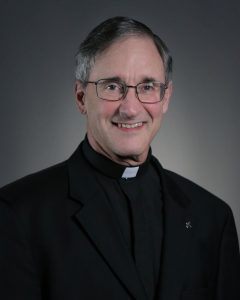The Archdiocese of Philadelphia rejoices to have 11 of her own priests appointed to be Archdiocesan Missionaries of Mercy. These priests are available to help facilitate pastoral initiatives that focus on conversion and divine mercy, with a particular attention given to the Sacrament of Reconciliation.
>>SEE RELATED: Archbishop Nelson J. Pérez Commissions Ten New Missionaries of Mercy
Missionaries of Mercy are priests – diocesan or religious – who have been commissioned by the Holy Father to give particular emphasis to the duty shared by all priests to “hear confessions and preach on behalf of and promote the Sacrament of Reconciliation.” They are to be an intentional, visible expression of the mercy of God, which is at the heart of the priesthood and all of Catholic life. In addition, Missionaries of Mercy have the authority, granted by the Holy Father, to pardon these sins reserved to the Holy See:
- Profaning the Eucharistic species by taking them away or keeping them for a sacrilegious purpose;
- Use of physical force against the Roman Pontiff;
- Absolution of an accomplice in a sin against the Sixth Commandment of the Decalogue;
- A direct violation against the sacramental seal by a confessor.
- The recording by means of a technical device of what the priest or the penitent says in a Sacramental Confession (whether real or simulated), or the divulgation of such a recording through the means of social communication.
CatholicPhilly presents the following interview with Reverend Charles Zlock, Pastor of Saint Raymond of Peñafort Parish in Philadelphia (Cedarbrook). Read our additional profiles on the new Missionaries of Mercy here.
***

Rev. Charles Zlock
Q: In what ways do you plan to integrate this special aspect of your priesthood into your daily activities and ministries?
I write a weekly parish bulletin article. I am going to focus articles on the ministry of mercy, especially during Advent and Lent. Parish leadership and I are discussing ways when I can offer the Sacrament of Reconciliation outside of the normally scheduled times.
One Saint Raymond Parish Priority from the Called for More initiative of Archbishop Pérez is our engagement with our young people. The departure of young people from church and the sacraments has been pronounced. This is especially the case in the black community. We plan to discuss this with our young people. In 2022, the Missionaries of Mercy did a survey. It examined the Best, Worst, and Most Common practices in the Sacrament of Confession. We would like to do the same at the parish, especially with our young people.
Q: How to do you plan to carry out this work beyond your current assignment?
I enjoy hearing school, Religious Education, and parish Confessions. These moments are also opportunities to enjoy fraternity with my fellow priests. I’d like to be especially conscientious in making myself available to hear Confessions at major archdiocesan events such as the Woman’s Conference, the Eucharistic Congress, and Abbeyfest.
Q: In what ways can lay individuals live out the message of mercy in their everyday lives?
Being kind and understanding in the midst of the frustrating events that we encounter every day. A lot of it has to do with respect for the other person and basic courtesy. Driving on the road is a prime arena. There are many examples. Drive at a reasonable speed. Give people the opportunity to merge into traffic easily. Let people go first rather than rushing to be the first through an intersection. Letting people go before us in a queue at the grocery store is another way for example. Holding doors for people at convenience or other stores. You notice a change in people’s expressions. These acts of kindness are graciously received, appreciated, and seemingly unexpected.
Q: The Sacrament of Reconciliation communicates God’s infinite mercy to us. What would you say to those who have been away from confession and may be looking to make it a regular part of their faith journey again?
God’s mercy is there. Just come. Try it once. Find a priest you know or like. Call me at Saint Raymond and celebrate the sacrament with me. I’ve often told my secretary and staff to interrupt my work day or a meeting to hear someone’s confessions if they come unexpectedly. It doesn’t take that long so the interruption is not seen as an interruption. Don’t believe the stories from people who talk about “when Father yelled at them at Confession.” That was probably years – even decades – ago. It’s the powers of darkness trying to keep you away from feeling joy, happiness, emotional freedom, spiritual relief, and a release from guilt and shame. Just come!
Q: What is your ultimate hope for your mission as an ambassador of mercy?
To see an increase in people celebrating the Sacrament of Reconciliation. If done in significant numbers, I believe that this will have noticeable effects in a big way throughout our society – in the way politicians interact with each other, in a more gracious tone in the media, in a decrease in the violence in our cities, in better interactions within families and within our parishes.
***
To learn more about the Missionaries of Mercy International, please visit http://missionariesofmercyusa.org/. To learn more about the Missionaries of Mercy in the Archdiocese of Philadelphia, https://archphila.org/mercy/.
PREVIOUS: Missionaries of Mercy: A Q&A with Rev. Christopher B. Rogers
NEXT: Bishop Esmilla’s Path from the Philippines to Philadelphia Paved by Service and Began in Prayer


Share this story